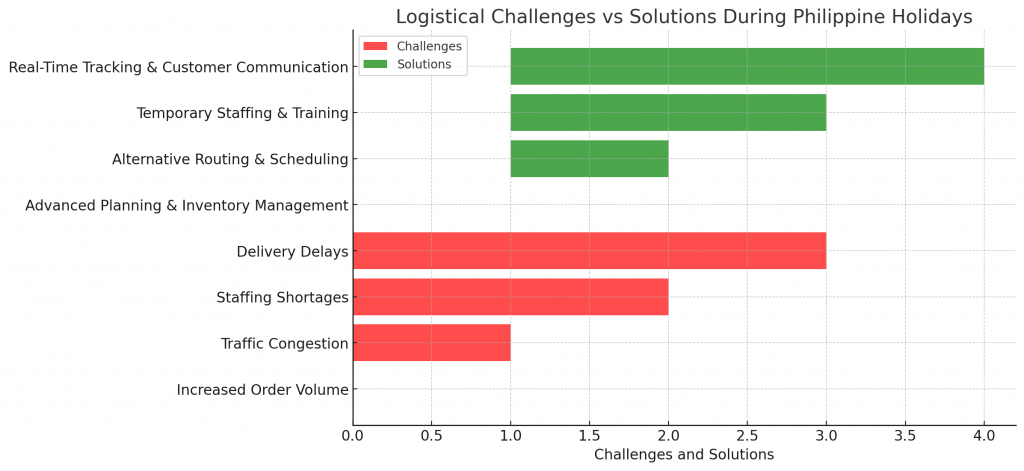
The Philippines, a nation known for its rich cultural heritage and festive celebrations, witnesses an intricate interplay of work and leisure during its numerous holidays. Malacañang, under the guidance of President Ferdinand Marcos Jr., has issued Proclamation No. 368, outlining the regular holidays and special non-working days for 2024. This proclamation is crucial for both individuals planning personal schedules and businesses, particularly in the logistics sector, adapting their operations to these significant dates.
2024 Philippine Holidays: A Detailed Breakdown
Regular Holidays
Here’s a look at the regular holidays as designated in Proclamation No. 368:
| Regular Holidays | Date (2024) | Day |
|---|---|---|
| New Year’s Day | January 1 | Monday |
| Maundy Thursday | March 28 | Thursday |
| Good Friday | March 29 | Friday |
| Day of Valor (Araw ng Kagitingan) | April 9 | Tuesday |
| Labor Day | May 1 | Wednesday |
| Independence Day | June 12 | Wednesday |
| National Heroes Day | August 26 | Monday |
| Bonifacio Day | November 30 | Saturday |
| Christmas Day | December 25 | Wednesday |
| Rizal Day | December 30 | Monday |
Special Non-Working Holidays
Additionally, these are the special non-working holidays:
| Special Non-Working Holidays | Date (2024) | Day |
|---|---|---|
| Chinese New Year | February 10 | Saturday |
| Black Saturday | March 30 | Saturday |
| Ninoy Aquino Day | August 21 | Wednesday |
| All Saints’ Day | November 1 | Friday |
| All Souls’ Day | November 2 | Saturday |
| Feast of the Immaculate Conception | December 8 | Sunday |
| Christmas Eve | December 24 | Tuesday |
| Last Day of the Year | December 31 | Tuesday |
Logistics Planning Around 2024 Holidays
The logistics sector must keenly observe these dates to optimize operations. For example, the increase in commercial activities during the ‘Ber’ months, especially around Christmas season logistics, requires adept handling of increased demands and potential traffic congestions, as seen in the hustle of Manila’s streets during holidays.
Embracing Technology for Efficient Logistics
In the digital age, leveraging technology becomes imperative. Advanced planning tools, real-time tracking, and efficient use of delivery vouchers are strategies that can mitigate the complexities of holiday logistics. This includes planning for days like Black Saturday, where traditional observances might impact staffing and operations.
Cultural Considerations in Logistics
Understanding the cultural significance of days like the Feast of the Immaculate Conception or Ninoy Aquino Day aids in creating culturally sensitive and efficient logistics strategies. For instance, adapting to the increase in gifting during these special days, and ensuring timely deliveries to enhance the seasonal gifting experience.
E-commerce and Customer Service During Philippine Holidays
The Philippine holidays, particularly in 2024, will have a significant impact on e-commerce. Special non-working days like the Chinese New Year and Christmas Eve amplify online shopping activities, leading to a substantial increase in order volumes. This surge requires logistics companies to be more agile and responsive. Effective order fulfillment and demand planning become paramount to ensure customer satisfaction and timely deliveries.
Key Strategies for E-commerce Success During Holidays
- Advanced Planning: Aligning inventory and staffing with anticipated demand spikes is critical.
- Efficient Fulfillment: Streamlining order processing and packaging to handle increased volumes.
- Real-Time Tracking: Utilizing technology for real-time updates and transparency for customers.
Customer Service: The Frontline of Holiday Logistics
During holidays, customer service in the logistics industry becomes even more crucial. Queries, order tracking, and delivery updates surge, necessitating robust customer service protocols. Maintaining high service standards, especially during peak seasons like the ‘Ber’ months, ensures customer trust and repeat business.
Enhancing Customer Experience
- Proactive Communication: Keeping customers informed about order statuses and potential delays.
- Responsive Support: Quick and effective resolution of customer inquiries and issues.
- Personalized Service: Understanding the emotional aspect of holiday deliveries, particularly for seasonal gifting.
Mitigating Logistical Challenges During Holidays
Holidays present unique logistical challenges, such as the dilemma of double-booking deliveries during the ‘Ber’ months. Proactive measures, like using predictive analytics to forecast demand and planning alternative delivery routes to avoid congested areas, are effective strategies.

The visualization above illustrates the primary logistical challenges faced during Philippine holidays, such as increased order volume and traffic congestion, and their corresponding solutions like advanced planning and alternative routing. This balance of challenges and solutions is crucial for logistics companies to navigate the festive seasons effectively.
Future Trends and Closing Thoughts on Holiday Logistics in the Philippines
As we look ahead, the logistics industry in the Philippines, particularly during holiday seasons, is poised for innovative transformations. The integration of technology, such as AI and machine learning, will play a pivotal role in enhancing logistics efficiency. Companies that adapt to these changes and prioritize customer satisfaction will thrive in this dynamic environment.
Anticipating Future Trends
- Increased Automation: The adoption of automation in warehousing and delivery processes.
- Sustainable Practices: A shift towards eco-friendly logistics solutions.
- Data-Driven Decision Making: Leveraging data analytics for more accurate demand forecasting and inventory management.
In conclusion, the array of holidays in the Philippines, from regular ones like Independence Day to special non-working days like All Saints’ Day, significantly impacts the logistics sector. Understanding these holidays, effective planning, and leveraging technology are key to navigating this landscape successfully. As individuals and businesses alike prepare for 2024, keeping these insights in mind will ensure a smoother, more efficient handling of logistics needs.
